Go back
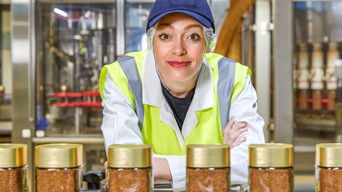
Coffee
Episode number: 1
Overview: How a factory in Derbyshire produces 175,000 jars of instant coffee every day, from green coffee beans to the freeze-dried final product. How roasting alters the chemical composition of coffee. How caffeine affects the body and brain. How climate change is affecting coffee harvests worldwide, and the coffee species that could cope with warmer growing conditions. The history of instant coffee going back to the American Civil War. How passion for coffee led to the founding of the Stock Exchange, auction houses and newspapers.
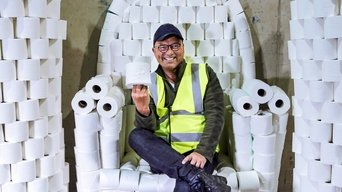
Toilet Roll
Episode number: 2
Overview: How a factory in Manchester produces 700,000 toilet rolls a day starting with spruce timber offcuts from Sweden, pulped and rolled onto 1.2-tonne 'mother reels'. How the water treatment works of Brighton remove debris, grease and bacteria to produce clean water in little more than an hour. How a high-tech Japanese toilet addresses hygiene. How waterless toilets could improve sanitation for one-third of the world's population. The history of the modern flush toilet.
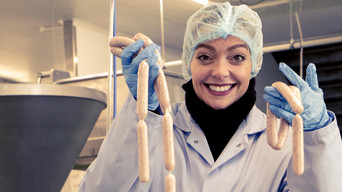
Sausages
Episode number: 3
Overview: How a factory in North Yorkshire produces 625,000 sausages a day, using machines that can fill 600 sausages in a minute. How low and slow shallow frying delivers the best combination of flavour, moistness and succulence. How veggie protein is created from a tiny speck of natural fungus. How a 'meat sock' is the secret to wrapping a Scotch Egg every three seconds. How German bratwurst became top dog in America, and how German immigrant Charles Feltman originated the hot dog. Cooking up a 2,000-year-old recipe for sausages. How the Romans contributed by importing pepper, bay leaves and other spices that spike modern sausages.
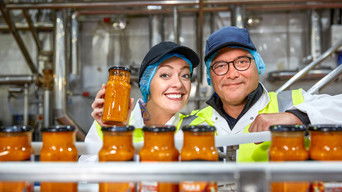
Curry
Episode number: 4
Overview: How a factory in Nottinghamshire produces 250,000 jars of curry sauce each day. How chillies are harvested on small farms in India, dried, packed down, and processed into chilli powder. How four rules for cooking rice guarantee it will come out right every time. Recreating a 1747 recipe for rabbit curry. How a British Asian housewife brought restaurant curries closer to Indian home cooking.
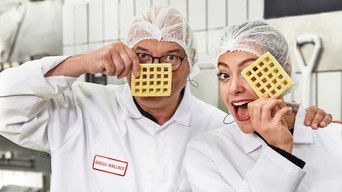
Potato Waffles
Episode number: 5
Overview: How a factory in Lowestoft produces 450 tonnes of frozen food each day. The differences between waxy and floury potatoes, and which you should use for which job. How the potato's nutritional value compares to other fruits and vegetables. The history of potatoes is traced to Spanish explorers and an enterprising French chemist called Parmentier, who popularised the exotic new vegetable. How Mr Whippy ice creams inspired the potato waffle, a teatime treat.
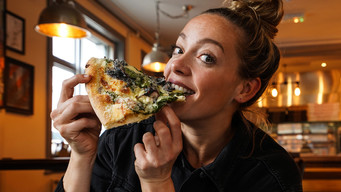
Pizza
Episode number: 6
Overview: How a factory in Italy produces 400,000 frozen pizzas each day. The science that makes mozzarella work so well on pizza. How pork is transformed into pepperoni. How freezer ships and trucks create the worldwide cold chain that enables this business to exist. How pizza was first popularised by a restaurant in London’s Soho in 1965
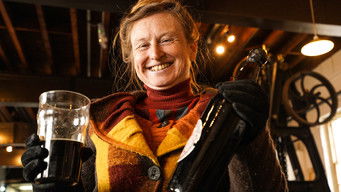
Beer
Episode number: 7
Overview: How Britain's biggest brewery produces 3 million pints of beer a day in Burton upon Trent. How four basic ingredients – water, malted barley, hops and yeast – are manipulated to make dark, heavy ales; light, fragrant lagers; and everything in between. How the hard water of Burton – perfect for brewing flavourful stouts and porters – and its position on the canal network made it the centre of brewing in 19th-century Britain. How beer-making turned from a predominantly female cottage industry to an industrialised process dominated by men.
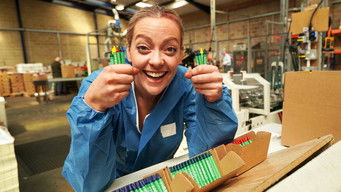
Pencils
Episode number: 8
Overview: Gregg Wallace is in Germany at a historic pencil factory where they produce 600,000 writing implements a day. Cherry Healey examines the astonishing properties of graphite. Historian Ruth Goodman traces the origin of pencils to a 15th-century graphite discovery in the Borrowdale valley.
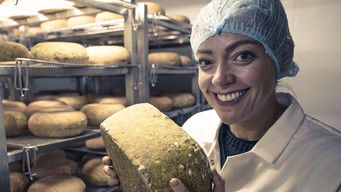
Cheese
Episode number: 9
Overview: How a cheese factory in Gateshead produces 3,000 tonnes of spreadable cheese every year - making cheddar, chopping and blending it with whey, water, and other ingredients. How bacteria affect the aroma, flavour and appearance of cheeses. How to make perfect cheese on toast. How cheddar became the predominant hard cheese world wide. How Kraft made processed cheese 100 years ago.